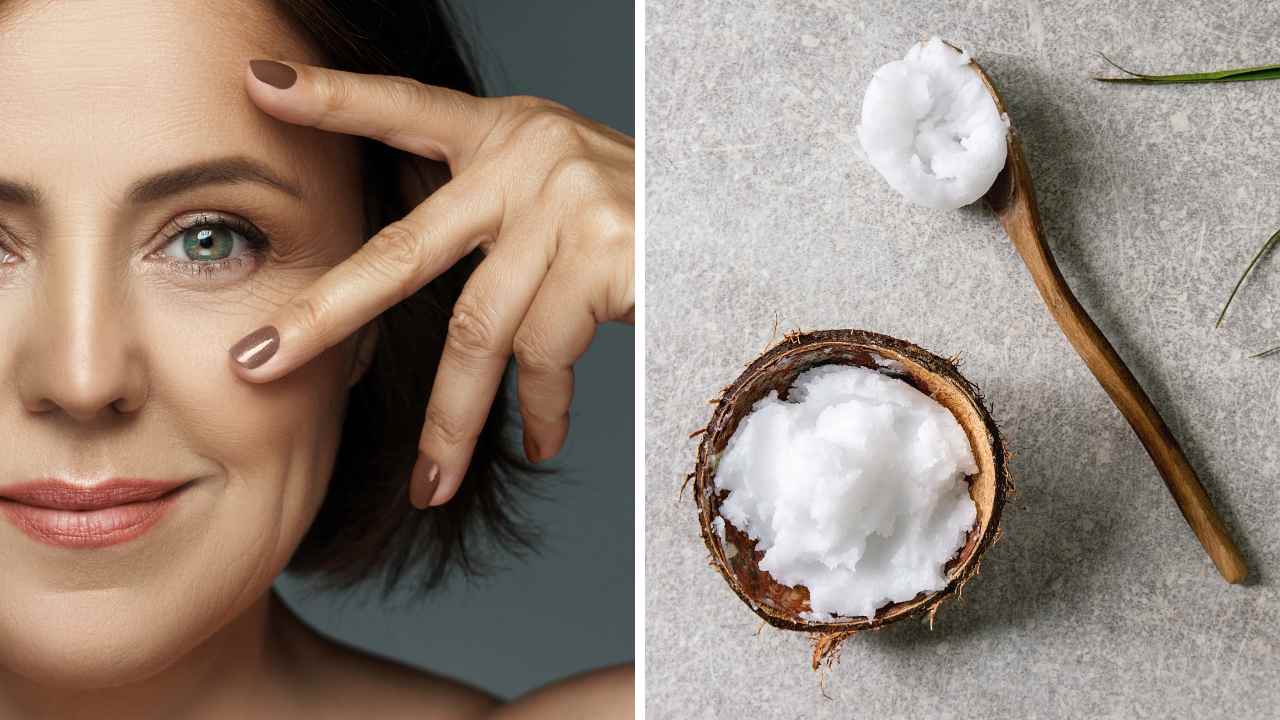
Is Coconut Oil Good for Crepey Skin? We Ask Skin Experts!
It seems like every day a new 'miracle' skincare product is all the rage. Coconut oil has been around for quite some time, but lately it's taken center stage as a go-to solution for many of our skin woes.
One issue we've been seeing more and more people asking about is how to use coconut oil on crepey skin, so we decided to ask the experts!
In this post, you'll get an inside scoop from dermatologists who know best when it comes to nourishing your skin with coconut oil and treating those pesky signs of aging so you can look and feel your best!
Read on to learn why coconut oil might just be your savior in combatting crepey skin.
What Causes Crepey Skin?
Crepey skin refers to skin that has lost its firmness and elasticity, resembling the texture of crepe paper. It commonly appears on areas such as the neck, arms, hands, and décolletage. If left untreated, it can deepen over time making you look even older than you are.
So what causes this age-revealing condition? Well, there are quite a few things that may be causing your crepey skin.
1) Sun Damage: Exposing yourself to too much UV radiation from the sun is one of the main and most common causes of crepey skin. Over time, ultraviolet rays break down collagen and elastin in your skin which causes thin and wrinkled skin.
The best way to combat this kind of damage from environmental factors is by using sunscreen with at least SPF 30 every time you go outside!
2) Aging: As we get older our bodies produce less collagen (the protein responsible for keeping our skin firm), leading to loss in elasticity; thus making us more prone to developing crepey wrinkles. Age-preventing skincare products such as retinols or peptides can help turnover of skin cells to keep these signs of aging at bay!
3) Dehydration: Not drinking enough water throughout the day can have an adverse effect on our complexion – leading it looking dryer than usual with a hint of sagging; thus furthering the development of crepeyness throughout the body. So make sure you stay hydrated if don't want super dry skin!
4) Smoking: We all know how bad smoking cigarettes is for our health but did you know that smoking hastens premature aging too?
Studies have shown that smokers tend to develop deep wrinkles around their mouth earlier than non smokers due to its effect on breaking down collagen fibers faster than normal – so quit now if premature aging isn’t something you want!
5) Weight Loss/Weight Gain: Rapidly gaining or losing weight plays a huge role when it comes to developing thinning skin since both activities increase stress levels within tissues creating an imbalance between fatty layers – ultimately resulting in weakened areas along with increased sagginess and wrinkling.
Coconut Oil's Impact on Your Skin
Coconut oil, extracted from the meat of mature coconuts of the coconut palm tree, is a versatile natural product known for its moisturizing and nourishing properties.
While scientific research on coconut oil's specific effects on crepey skin is limited, there are several reasons why it may be beneficial:
1. Hydration and Moisturization: Coconut oil is rich in fatty acids, including lauric acid, which means coconut oil helps to nourish and hydrate the skin. When applied topically, it can create a protective barrier that locks in moisture and prevents water loss, improving the skin's overall hydration levels.
Properly moisturized skin appears plumper and more supple, which can help reduce the appearance of crepey skin.
2. Antioxidant Protection: If you have crepey skin coconut oil contains natural antioxidants, such as vitamin E, that help neutralize free radicals, which are harmful molecules that can contribute to skin aging and damage.
By providing antioxidant protection, coconut oil may help prevent further degradation of collagen and elastin fibers, which are essential for creating skin elasticity.
3. Skin Elasticity and Smoothness: The presence of medium-chain fatty acids in coconut oil, particularly capric and caprylic acids, can contribute to improving elasticity.
These saturated fatty acids can penetrate the skin easily, to improve collagen production, coconut oil enhances the skin's natural barrier function. Regular use of coconut oil may help restore the skin's suppleness and reduce the appearance of crepey skin.
4. Anti-Inflammatory Effects: Coconut oil contains compounds with potential anti-inflammatory properties, such as polyphenols and fatty acids.
Inflammation can contribute to skin aging and the breakdown of collagen and elastin. By reducing inflammation, coconut oil may help mitigate the factors that lead to crepey skin.
Incorporating Coconut Oil into Your Skincare Routine
If you're considering using coconut oil to address crepey skin, here are some tips to help you incorporate it into your skincare routine effectively:
1. Choose High-Quality, Organic Coconut Oil: Opt for virgin or extra-virgin coconut oil that is unrefined and cold-pressed. This ensures that you're using a high-quality product without added chemicals or processing.
2. Perform a Patch Test: Before applying coconut oil to larger areas of your body, perform a patch test on a small area of skin to ensure you don't have any adverse reactions or allergies.
3. Cleanse and Exfoliate: Start by cleansing your skin to remove any impurities. Exfoliating the skin gently can help enhance the absorption of coconut oil.
4. Apply Coconut Oil: Take a small amount of coconut oil and warm it between your palms to melt it. Gently massage the oil into the areas of concern, focusing on the crepey skin. Massage in upward motions to promote circulation and absorption.
5. Use as a Night Treatment: Coconut oil can be used as a nighttime treatment, allowing it to penetrate and nourish the skin while you sleep. Apply it as the last step in your skincare routine, allowing it to fully absorb before bedtime.
6. Consistency is Key: For optimal results, consistency is essential. Incorporate coconut oil into your skincare routine regularly and give it time to work its magic. Results may vary for each individual, so be patient and persistent.
Dr. Luke Maxfield loves coconut oil for the skin and recommends even more uses for this natural oil in your self care routine.
@dr.ljmaxfield Ive always loved coconut oil. Perhaps the smell perhaps the science? Here are some highlights #dryskin #coconutoil #moisturizer #naturalskincare #skincare
♬ Feeling Good - Dirty Heads
Dr. Abby Waldman, a board certified dermatologist, says it's even okay to use coconut oil on your face. That's as long as you don't suffer from acne prone skin. If you have very oily skin, coconut oil can cause clogged pores because it is highly comedogenic.
@drabby6 Coconut oil is a popular moisturizer and is even safe to use on your face at night if you like it. Avoid if you’re acne prone and don’t use as your primary sunscreen. #coconutoil #moisturizer #skincare #dermatology #boardcertifieddermatologist
♬ original sound - Dr. Abby / Dermatologist
Results Vary From Person to Person
While coconut oil may offer potential benefits for crepey skin, it's important to note that individual experiences may vary.
Additionally, coconut oil may not be suitable for everyone, especially those with oily or acne-prone skin. It's always recommended to consult with a dermatologist or skincare professional before making significant changes to your skincare routine.
Coconutty (Not Crepey) Skin
Taking good care of your skin is an essential part of any beauty routine, and using coconut oil as a natural remedy to treat crepey skin may be just the thing for those looking for an additional boost.
It packs a punch with its hydrating, nourishing, and potentially collagen-boosting effects. Approach this all-natural ingredient with enthusiasm and give it a try if you're ready to take charge of your skin health.
Keep in mind that quality matters when it comes to selecting the right product — do your research to find one that works for you!
Finally, consistent application is key when wanting to see minimum improvements — give yourself time to witness the potential benefits of coconut oil for crepey skin. Here's to unlocking the potential of coconut oil for improving crepey skin!

















